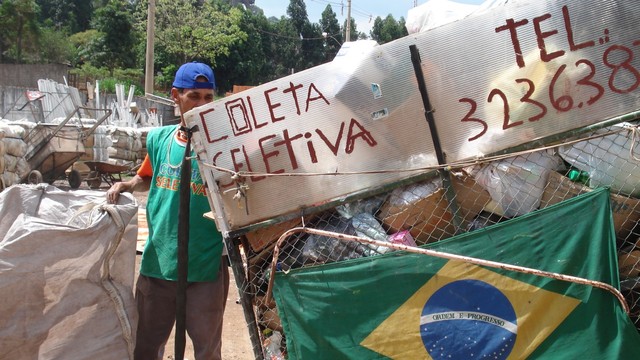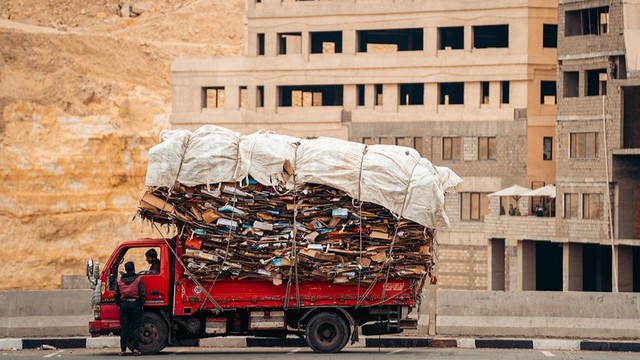Development frontiers
A workshop organised by research funders highlighted how innovative solutions must be found for the 'wicked' problems we face today.


Women in Ahmedabad, India, collect rubbish from 6,656 households that make up the slum area of Juna Vadaj, illustrating the energy and innovation that informal economies can bring to the sustainable development agenda (Photo: Pritpal Randhawa for STEPs)
Making sustainability work for everyone requires things to be done differently. Be it at the global level, through national frameworks or community based actions, new perspectives and novel solutions are the order of the day.
That was the message two major funders of British government research sent out at a recent Development Frontiers workshop. Put simply, the world faces a set of 'wicked problems' such as climate change, poverty and fragility. They are 'wicked' because the solutions to one can worsen or undermine the others.
So, what were the messages researchers from across the UK heard, and how did they respond?
Scale of the problem
As Simon Maxwell, organiser of the workshop, said at the start, the Paris Agreement on climate change is significant, but the current promises to cut emissions will only deliver a quarter of the reductions needed by 2030.
And we don't yet have what it takes to speed the transformation process up. According to Nick Mabey, the models for transitioning away from our current economy don't exist. Governments, companies, investors and the public in general like to talk about a lack of investment, technologies or regulation, but Mabey says there is more than enough money to invest, and plenty of technologies to invest in.
What is missing is a proper understanding of what transition out of our current economy to one that is more sustainable will involve for real people, big companies, large investors, and the political status quo.
Less growth
I wrote about some of this with Leo Johnson in Turnaround Challenge, and the ideas we came up with then are informing some of IIED's work on sustainable markets.
Less growth, cleaner energy and more regulation will not deliver the transition to a low carbon economy or one with less inequality for instance. Cutting growth, for example, leaves people and countries unable to pay off their debts? If they default, where do they find the money for education, health and better lives in the future?
Deep transition
Johan Schot, another keynote speaker, said that what we were facing was a 'deep transition' where many systems – political, industrial, social, financial etc – need to change simultaneously so that they are moving in the same direction.
He highlighted the complexity of the problem, but it isn't clear what will move institutions in a similar direction unless we resort to some kind of Stalinist-inspired state.
Schot is a pioneer of complex adaptive systems theory, which I have always found better for analysing the past rather than predicting the future. Ironically, that's the same charge that can be levelled at neo-classical economics, a theory of social behaviour and change criticised by complex adaptive systems theory.
What Schot rightly pointed out, though, is that there are many more innovators than are currently recognised. This comes through time and time again in IIED's work on dialogues, partnerships and change.
He also seemed to be describing large parts of IIED's research and advocacy agenda when he talked about the need to build capacity of those at the margins. He advised funding bodies not to give up too soon on experiments that appeared to be struggling early on.
Poverty and transition
The final speaker, Frances Stewart, focused on how poverty played into the deep transition process. She criticised current policies for focusing on the security threats that were a consequence of poverty and fragile states, rather than on alleviating the poverty that causes conflict and insecurity.
Taking the three keynote speeches together, it was hard not to conclude that the issues at the heart of the new development frontiers were the same ones that have long been at the heart of IIED's work.
Poverty and inequality? Yes. Inclusive approaches to policy and problem solving? Yes. Capacity building for the marginalised? Yes. Engaging with influential actors at all levels of the economy and government? Yes.
Given that the challenges of sustainability lie at the heart of IIED and its partners' work it was perhaps surprising to hear researchers from some universities waking up to the need to engage more with policymakers. This is something that IIED and its partners take for granted. It was obvious too that transition and change was very new and uncomfortable for some people in the room.
There were a lot of things missing from the conversation, notably any mention of the private sector, except as a threat to progress.
But these are early days in creating a new research programme, and the initial signs are that it is one that IIED and its partners can contribute to enormously.
Mick Blowfield (mick.blowfield@iied.org) is the director of IIED's Sustainable Markets Group.


